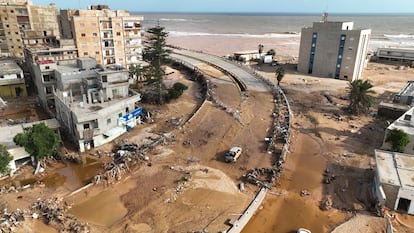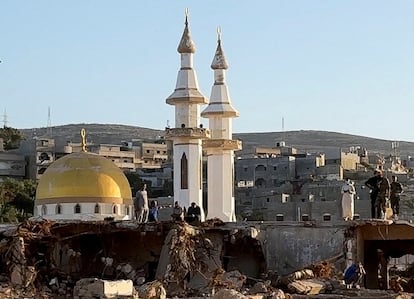Floating bodies, thousands missing and helplessness in devastated Libyan city of Derna
International aid is gradually arriving in the flood-hit region after rains from Storm Daniel smashed through two dams. According to a local official, 25% of the town has disappeared

It was 2:30 a.m. on September 11 when the inhabitants of Derna, eastern Libya, heard an explosion that shook the streets. The two nearby dams had just collapsed due to heavy rains caused by Mediterranean Storm Daniel. Within half an hour, a deluge devastated the coastal town. Shocked residents say that the torrents of water covered Derna, destroying large residential buildings, and sweeping houses and their residents out to sea. Unofficial estimates from local authorities suggest thousands of people have been killed and at least 10,000 people are missing across Libya. Derna bore the brunt of the tragedy and the toll is expected to rise.
The “sea is constantly dumping dozens of bodies,” Hichem Abu Chkiouat, minister of civil aviation in the administration that runs eastern Libya and a member of the government’s emergency committee who briefly visited Derna, told Reuters by telephone on Wednesday. “We have counted more than 5,300 dead so far, and the number is likely to increase significantly and may even double because the number of missing people is also thousands,” Chkiouat added, referring to the death toll in the region.
The testimonies from residents of this town of some 100,000 inhabitants are heartbreaking: entire families swept away by the water, floating corpses, bodies piling up in makeshift hospitals and morgues, thousands of people without a roof under which to shelter...
“The flow of water did not stop and swept down the streets, toppling houses. When the sun came out, many streets in the city were destroyed,” said Amira Zaatut, a 45-year-old survivor, in a telephone conversation with this newspaper. Several members of her extended family, both adults and children, have died, she says, adding that no rescue teams have managed to enter the city yet and citizens are attempting to help one another.

According to the United Nation’s International Organization for Migration (IOM), at least 30,000 people have been displaced in Derna alone. Tariq Kharaz, a spokesman for the authorities in eastern Libya, said that 3,200 bodies had been recovered in the region. The local government admits it does not have the expertise to deal with the aftermath of such a catastrophe. “You need equipment that the Libyan authorities cannot provide, such as helicopters,” the local deputy mayor, Abdulmonem Algaithi, said in a video, appealing for international aid and declaring Derna a disaster zone.
The internal political situation in Libya is also undermining the aid effort, as the country has been mired in instability for more than a decade and is currently politically and administratively divided into two rival governments, one based in the east and the other, recognized by the international community, in the capital, Tripoli. This schism, coupled with violence, militias, and corruption, means that the country lacks infrastructure and services capable of either anticipating or coping with a natural disaster of this scale.
“I saw children crying as they were swept away by the water and I prayed to God to receive their souls and put an end to their suffering,” Sundus Shwib, a resident of Derna, wrote on her blog from the hospital where she has been admitted. “My bones are broken and for a moment I thought I was dying, but I ended up in a place where the water was shallow,” she explained. “I have seen family members, dear friends, and neighbors pass away in front of my eyes and at this point I am no longer interested in living.”

“Bodies are lying everywhere”
Speaking to local station Al Masar TV, another survivor, Nabil Azuz, who is in his 60s, explained how he and his only son were trapped by the water within minutes. “We started struggling through the water while my son tried to push me out of the rooms, which were flooding. He managed to do it, but he got stuck in a doorway and I never saw him again. The last thing he said to me was, ‘Forgive me father,’” he said through tears at the local hospital to which he was taken.
According to Abu Chkiouat, 25% of the city has ceased to exist. “Bodies are lying everywhere: in the sea, in the valleys, under the buildings,” he told Reuters.
Medical authorities in the town of Tobruk, about 60 miles from Derna, reported that the city morgue can no longer receive any more bodies. Prime Minister Abdelhamid Al Dabeiba admitted during an emergency government meeting on Tuesday that neither the city’s cemeteries nor those in neighboring towns have the capacity to bury the huge number of deceased, and has asked his department to find an urgent solution to the problem.
But Derna seems to be facing its fate alone for the time being. The only online media outlet operating from inside the city, Derna Zoom, has stated that no rescue teams had managed to get to the devastated area as of Tuesday afternoon, due to the impossibility of land access. Only two helicopters have been seen trying to pick up bodies floating in the water, which were sent by the Libyan National Oil Company, according to the same media outlet.
U.N. Humanitarian Affairs chief Martin Griffiths announced a $10 million aid package for Libya on Tuesday. In the specific case of Derna, the U.N. Office for the Coordination of Humanitarian Affairs in Libya has announced its mobilization to help the inhabitants of the city, in coordination with local authorities. Rescue teams from Turkey have already arrived in eastern Libya, according to local authorities, and countries such as Algeria, Egypt, Italy, Qatar, and Tunisia have also offered their assistance. France is sending a field hospital and some 50 military and civilian personnel capable of caring for 500 people a day, officials said.
Sign up for our weekly newsletter to get more English-language news coverage from EL PAÍS USA Edition
Tu suscripción se está usando en otro dispositivo
¿Quieres añadir otro usuario a tu suscripción?
Si continúas leyendo en este dispositivo, no se podrá leer en el otro.
FlechaTu suscripción se está usando en otro dispositivo y solo puedes acceder a EL PAÍS desde un dispositivo a la vez.
Si quieres compartir tu cuenta, cambia tu suscripción a la modalidad Premium, así podrás añadir otro usuario. Cada uno accederá con su propia cuenta de email, lo que os permitirá personalizar vuestra experiencia en EL PAÍS.
¿Tienes una suscripción de empresa? Accede aquí para contratar más cuentas.
En el caso de no saber quién está usando tu cuenta, te recomendamos cambiar tu contraseña aquí.
Si decides continuar compartiendo tu cuenta, este mensaje se mostrará en tu dispositivo y en el de la otra persona que está usando tu cuenta de forma indefinida, afectando a tu experiencia de lectura. Puedes consultar aquí los términos y condiciones de la suscripción digital.








































